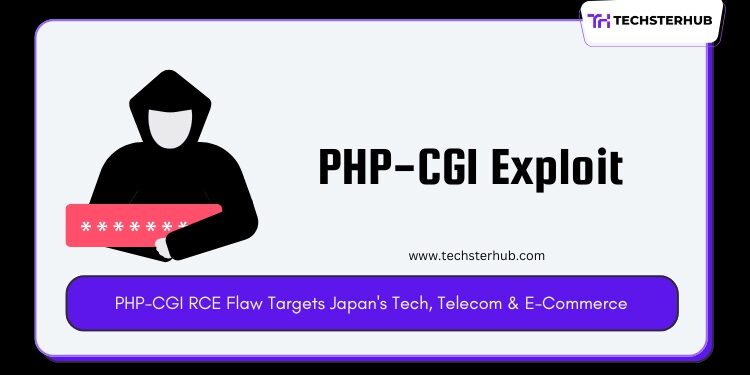A well-known PHP-CGI web server software flaw triggered a series of cyberattacks focused on Japan’s technology companies alongside telecommunications and online retail businesses. The Remote Code Execution (RCE) flaw enables attackers to execute harmful code on servers with the potential outcome of data breaches along with service disruptions and illicit access to confidential data. The escalation of these attacks makes it crucial to comprehend the flaw’s characteristics and its potential effects while understanding how businesses and individuals can safeguard themselves.
What is PHP-CGI and Why Does it Matter?
As a server-side scripting language PHP (Hypertext Pre-processor) serves as the foundation for numerous websites and web applications. The PHP Common Gateway Interface (PHP-CGI) enables web servers to run PHP scripts which allows websites to generate and deliver dynamic content. The PHP-CGI method has been utilized for many years while continuing to operate on numerous websites, especially those with legacy systems.
Various security weaknesses have emerged throughout time even though PHP-CGI remains popular. The Remote Code Execution (RCE) vulnerability stands out as a major flaw because attackers can execute their custom code on a server without proper authorization. Hackers could gain full control of affected systems through this vulnerability to steal data and perform system disruptions or use compromised systems to launch additional attacks.
What is Remote Code Execution (RCE)?
Remote Code Execution (RCE) represents the top tier of dangerous cybersecurity vulnerabilities. Remote code execution lets hackers run their own code or commands on compromised servers from distant locations without the server owner’s awareness or permission.
The PHP-CGI flaw allows attackers to exploit the vulnerability through specially crafted requests targeting servers that run vulnerable PHP-CGI versions. The attacker gains full control of the server which leads to several potential consequences.
- Data Theft: Through exploitation attackers gain access to critical sensitive information that includes customer data along with financial records and proprietary business data.
- Service Disruptions: Once attackers gain access, they utilize the server to execute Distributed Denial of Service (DDoS) attacks or to disable essential systems.
- Malware Deployment: Attackers may utilize servers that have been compromised as platforms to distribute harmful software programs such as ransomware and additional malware variants.
- Further Attacks: Attackers who gain access to a system can move to other linked systems to increase their attack coverage.
Exploitation of the PHP-CGI Flaw in Japan
Recent attacks against Japan’s tech, telecom, and e-commerce industries have exploited the PHP-CGI remote code execution flaw actively. Essential services rely on web servers which makes these sectors prime targets for cyber-attacks. This section provides a detailed breakdown of the attack progression.
Targeted Sectors:
- Tech Companies: The majority of Japan’s technology companies develop web applications and cloud services using PHP-CGI. The RCE vulnerability allowed attackers to penetrate systems and exfiltrate intellectual property and customer data.
- Telecom Providers: Telecom providers are top targets because they operate extensive infrastructure systems and store enormous quantities of user information. Attackers using the RCE flaw to exploit systems can gain unauthorized access to both communications infrastructure and customer information.
- E-Commerce: The e-commerce sector plays a crucial role in Japan’s economy while websites frequently manage sensitive payment and personal customer data. By taking advantage of this vulnerability cybercriminals can gain unauthorized access to sensitive financial transactions or customer accounts.
The Attack Method:
- Vulnerable servers running PHP-CGI receive specially crafted HTTP requests from cybercriminals. Attackers take advantage of the RCE flaw through these requests to execute code from a remote location.
- Malicious code execution allows attackers to take server control and perform actions like malware installation and data theft along with service disruption.
The Scope of Impact:
- The attacks have caused extensive damage because the organizations impacted lacked current security patches and effective mitigation procedures.
- Attackers took advantage of existing vulnerabilities over extended periods before detection which led to substantial harm to both the corporate reputation and financial standing of affected companies.
Why This Is a Big Deal
This PHP-CGI RCE vulnerability creates major threats for companies and individuals because it exposes multiple attack vectors.
- Widespread Use of PHP: PHP stands as a leading programming language used extensively across web development projects. Online services from different sectors depend on PHP within their organizational frameworks. The RCE flaw affects not just Japanese businesses because organizations around the world using old PHP-CGI versions face potential dangers.
- Exploitation is Active: The current active exploitation of this flaw by hackers establishes it as an urgent concern that demands prompt attention. The selection of vital sectors like technology, telecommunications and e-commerce as targets demonstrates the weaknesses present within essential infrastructure systems.
- Data Privacy Risks: Sensitive personal and financial information represents the types of data at risk of exposure or theft during these attacks. E-commerce and telecom service providers face serious customer privacy threats that could lead to legal penalties and damage both reputation and customer confidence.
- Financial and Operational Damage: Successful RCE attacks lead to more than just data theft. The impact of attacks includes operational disruptions which lead to service outages and necessitate costly remediation work. Businesses that depend heavily on online infrastructure face significant financial costs when recovering from an attack.
Steps to Protect Against the PHP-CGI RCE Flaw
Organizations need to act now to defend their systems against the PHP-CGI RCE vulnerability. Businesses and individuals can take the following important steps:
- Update PHP and Apply Patches: Maintaining the security of PHP installations requires keeping the software up to date and ensuring it contains no known security flaws. Frequent monitoring of PHP developer security updates followed by immediate application of patches remains essential for organizational protection.
- Switch from PHP-CGI: Switching from PHP-CGI to PHP-FPM (FastCGI Process Manager) represents a more secure configuration choice for businesses because PHP-FPM delivers superior security benefits alongside enhanced performance.
- Regular Security Audits: Organizations need to schedule regular security audits to discover and fix system vulnerabilities. The audit process requires verification of current software versions while identifying configuration errors and potential security threats.
- Implement Web Application Firewalls (WAF): A Web Application Firewall (WAF) protects systems by detecting and stopping malicious HTTP requests designed to exploit RCE vulnerabilities. Web Application Firewalls (WAFs) provide extra security which helps protect against cyberattacks.
- Monitor and Respond to Security Incidents: Organizations need to actively watch their networks and servers for indicators of suspicious activity. Upon detecting an attack organizations must act swiftly to reduce damage and stop additional exploitation.
Conclusion
Japan’s technology, telecommunications, and e-commerce sectors face active exploitation due to the PHP-CGI RCE vulnerability which stands as a significant cybersecurity threat. The recent attacks demonstrate how essential it is for organizations to keep their software updated and enforce robust security measures. Organizations dependent on PHP-CGI need to rapidly apply patches to vulnerabilities to stop potential harm. Businesses must treat cybersecurity as a top priority because cybercriminals keep attacking major industries which requires proactive defense strategies.











